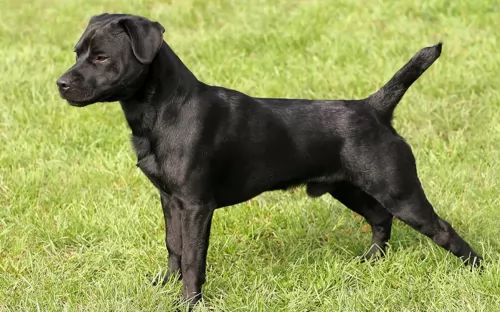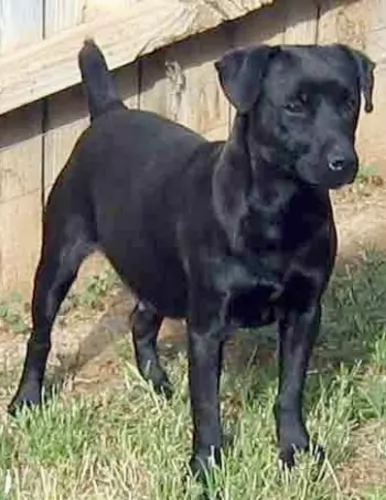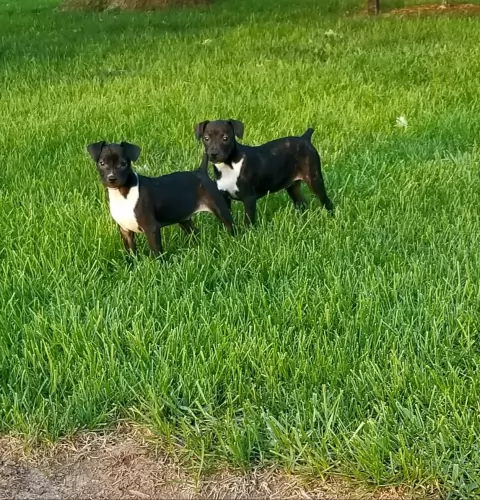 Petzlover
PetzloverPatterdale Terrier is originated from United Kingdom but Schnauzerdor is originated from United States. Patterdale Terrier may grow 22 cm / 8 inches shorter than Schnauzerdor. Patterdale Terrier may weigh 28 kg / 61 pounds lesser than Schnauzerdor. Both Patterdale Terrier and Schnauzerdor has almost same life span. Patterdale Terrier may have less litter size than Schnauzerdor. Both Patterdale Terrier and Schnauzerdor requires Low Maintenance.
 The Patterdale was developed in England,with his origins being linked to an early breeder with the name Joe Bowman.
The Patterdale was developed in England,with his origins being linked to an early breeder with the name Joe Bowman.
They were sought after for their prowess at guarding sheep from foxes. The dog was recognized by the United Kennel Club in 1995. It is believed the dog is descended from the Northern terrier breeds and can be traced far back.
With these modern day mixed-breeds, there is no history or records of when they came into being so we assume the USA. And so it it with the Schnauzer Lab mix breed. Each of the parent dogs – the Schnauzer and the Labrador, have their own histories.
It is uncertain how the Schnauzerdor came into being. Not so long ago, puppies born from different parents were simply labeled mongrels, but today they have been specifically bred. With these dogs you are never really sure how the puppies will turn out, and even within one litter, the puppies can be different looking.
 The Patterdale Terrier is a small sized dog that stands at between 25 and 40 cm in height and weighs 5 to 7kg.
The Patterdale Terrier is a small sized dog that stands at between 25 and 40 cm in height and weighs 5 to 7kg.
The coat of the dog can be smooth, broken or rough, but all coats are double and weatherproof. Colors include red, liver, black, bronze, black and tan or chocolate and sometimes brindle. The ears are floppy and medium length and the tail is also medium length and held high, curving slightly. It used to be docked and then ¼ to 1/3 of the tail was removed.
The Patterdale Terrier is small but he is bold and confident and very energetic. He will certainly need to be in a household where the family members are active, busy people. Because he is strong-willed he will benefit from training and socialization which will make him obedient and able to behave well in different situations.
A Schnauzer Labrador or Schnauzerdor is much the same size of the Labrador if the parents were a Labrador and a standard Schnauzer.
You can expect the height to be roughly between 50 to 62cm and weight could be anything from 20 to 35kg. Everything will depend on the size of the Schnauzer really as there are 3 kinds – miniature, standard and giant.
There’ is no way of knowing what physical characteristics the Schnauzerdor will get from each parent. The coat of these dogs can be anything from smooth to wiry and they can also be in a number of different colors, from yellow to cream, grey, black, brown.
Schnauzers and Labradors are intelligent dogs so the Schnauzerdor is guaranteed to turn out smart. Make sure that your Schnauzerdor receives training and socialization. Clever dogs like this won’t battle with training and it can ensure your pet is obedient and balanced, knowing how to behave around different people and in different situations.
Schnauzers are considered non-shedding and hypoallergenic, so it could be that your Schnauzerdor ends up with a low shedding coat.
Your dog is likely to be social, playful, energetic and a good watchdog. They are loving and loyal to their human family members.
 Intelligent, courageous and feisty, the Patterdale Terrier is a dog that will get on well with everyone in the house. Those who are active and outdoor types will be the best kind of dog owners for this active, energetic dog.
Intelligent, courageous and feisty, the Patterdale Terrier is a dog that will get on well with everyone in the house. Those who are active and outdoor types will be the best kind of dog owners for this active, energetic dog.
The Patterdale is confident and strong willed and will do superbly well with some training and socialization. With lots of love and care, your Patterdale Terrier can make you an excellent family pet and companion.
The Schnauzer Lab is a crossbreed so this essentially means that your dog can have behavioral traits from either of the parents.
They're social, friendly, loving dogs that can also make good watchdogs. The Schnauzerdor gets on well with children and can get on with other dogs too. With training and socialization he becomes much more amicable and obedient, making a super family companion.
You can be sure that he is going to make your family a great playmate, friend and pet.
 The good news is that terriers have few health problems and they can live to a ripe age. Just like other dogs, they can also battle with some of the common dog ailments there are.
The good news is that terriers have few health problems and they can live to a ripe age. Just like other dogs, they can also battle with some of the common dog ailments there are.
Most allergens are foods, medicines or insects and exposure to the allergen can cause an over-reaction. In a dog, the most common symptom associated with allergies is itching of the skin. It can drive your pet mad as he licks and bites his skin. The symptoms of allergies can involve the respiratory system and he will have coughing and sneezing or even a discharge from the eyes.
Your Patterdales can also develop cataracts and glaucoma – two kinds of eye diseases. Glaucoma can unfortunately lead to blindness but something can be done if you recognize the signs. There are 2 main types of canine glaucoma, characterized by pressure inside the eye which can do damage to the retina and optic nerve – primary- and secondary glaucoma. Your vet will try to determine whether your pet has primary or secondary glaucoma to determine treatment.
Your Schnauzerdog can live to be between 10 and 14 years of age if looked after well. There are some dog illnesses that many dogs succumb to, regardless of breed or age -
Hip dysplasia is when the hip joints don’t develop properly. You notice your dog is reluctant to play and even battles to get up again after lying down. Hip dysplasia can lead to painful arthritis and you will need to get him to the vet for pain relief and a treatment plan.
This dog loves his food, and because you love him so much, it will be tempting to pop treats into his mouth all the time. It is so easy to overfeed these dogs and obesity is a big problem and can contribute to joint problems with a dog as well as strain on the heart and other organs.
 Your Patterdale Terrier has a lot of energy, so as a responsible dog owner, you will need to see that he is exercised properly. This will include a walk every day as well as spending time throwing balls or a frisbee for him. He is a working breed and has been used to being mentally and physically stimulated.
Your Patterdale Terrier has a lot of energy, so as a responsible dog owner, you will need to see that he is exercised properly. This will include a walk every day as well as spending time throwing balls or a frisbee for him. He is a working breed and has been used to being mentally and physically stimulated.
The Patterdale Terrier isn’t a high maintenance dog and his coat will simply require a brush twice a week. Your pet can’t tell you about any pain he is experiencing so you will need to watch his body language.
Dogs can easily pick up an ear infection and this can be very painful. When you brush your pet, check inside his ears for signs of redness and discharge and check inside his mouth to see if you can spot any rotten teeth. Bad teeth can wreak havoc on his health. Keep the nails trimmed.
If you intend feeding your pet commercially manufactured food, good and well because it is a convenient way to feed your pet, but make sure its a quality food. This will ensure your dog is getting in the right amount of vitamins and minerals.
To vary his diet just a bit, provide him with some home-made food such as boiled chicken, brown rice or pasta, and some wholesome vegetables such as carrots, spinach and sweet potato. Dogs love the simplicity and nutritional value of food like this, and they don't have to worry about getting a stomach ache from strange foods. Try and include some raw meat into the kibble from time to time as well.
Never leave your Paatterdale Terrier without a constant supply of fresh cool water.
Check your Schnauzerdor’s ears and eyes for infection. Look inside his mouth and check for bad teeth. When you brush him twice a week, check him over for new lumps.Trim his claws.
Your Schnauzerdor is an active dog and he will require vigorous exercise every day. A daily walk won't be enough for this dog. He will want runs in the park off his leash as well as rope- and ball games.
Give your Schnauzerdor the best chance to enjoy good health by providing him with good food.
There are some good commercially manufactured dog foods out there and they can be a good, convenient choice, especially if you choose the high quality ones known for their wholesome, natural ingredients.
Give him some home-made food too which can be added into the dry kibble twice a week. Boil brown rice and chicken in a pot and add in sweet potatoes, carrots and spinach. Chop all this up and as a treat, add some of this into the dry kibble.
Your dog’s wagging tail will be all the thanks you need. Try to also include some raw meat occasionally. Never leave your pet without a constant source of fresh, cool water.